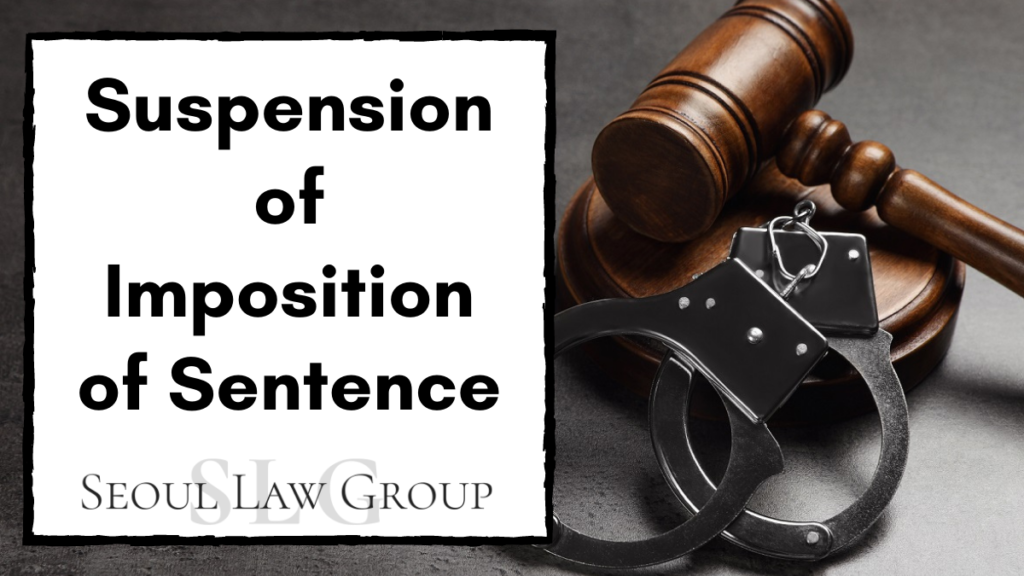Let’s say that you are a defendant of a criminal trial. The best thing that can happen for you is, of course, getting a “not guilty” verdict. But what if you have actually committed the crime? What would be the best thing that can happen to you when you’re the one who had done it, and the judge knows it too?

Let’s see what is written on Criminal Act, Article 59(1):
Article 59 (Requisites for Suspension of Impositions of Sentence)
1. If, in cases where punishments of imprisonment or imprisonment without prison labor for not more than one year, suspension of qualifications, or fines are to be imposed, there are extenuating circumstances in application of the provisions of Article 51 and the accused shows sincere repentance, the imposition of sentence may be suspended: Provided, That this shall not apply in case of a person who has previously been convicted and received a sentence of suspension of qualifications or more severe punishment.
Article 59(1) is a provision about “suspension of imposition of sentence,” which is an act that the court declares the defendant guilty, and chooses the punishment, but somehow still suspends the imposition of sentence, so that the defendant would go free for now.
There are two requirements to declare “suspension of imposition of sentence.” One, the defendant should be sentenced for imprisonment or imprisonment without prison labor for not more than one year, suspension of qualifications, or fines. For instance, the court cannot suspend the imposition of sentence if the defendant is sentenced for two years in prison.
Second, there should be extenuating circumstances in application of Article 51. Let’s see what Article 51 is about.
Article 51 (General Principles for Determination of Punishment)
In determining punishment, the following shall be taken into consideration:
1. The age, character and conduct, intelligence and environment of the offender
2. Offender’s relation to the victim
3. The motive for the commission of the crime, the means and the result
4. Circumstances after the commission of the crime.
When these two requirements are met, the court can suspend the imposition of sentence for the defendant in their discretion. The defendant can go free. They don’t have to go to prison, or pay the fine, and even their criminal record remains still clean, as if they were acquitted.
That’s not all. The reason why we said that “suspension of imposition of sentence” is the best thing that can happen for defendant, only seconded by “not guilty” verdict, is because of Article 60.
Article 60 (Effect of Suspension of Imposition of Sentence)
After two years have elapsed since the suspension of imposition of sentence, that suspension shall be deemed to be acquitted.
So, if the two years has passed, everything becomes the same just like the defendant was acquitted. Of course, this only applied if the defendant spent those two years without committing any more crime. If the defendant committed another crime within those two years, the suspense is nullified, and the suspended sentence would be imposed to the defendant.
Please let us introduce SLG’s recent success related to this subject. Our client was charged with “infringement of another person’s confidential information” for looking inside her husband’s phone without his permission and taking pictures of his private text messages. But there was a good reason behind her crime. Her husband has been cheating on her and was secretly planning to divorce her to get married to his lover, even though he knew that she was poor and had nowhere to go if she was kicked out from his house. She had her doubts that her husband might’ve been cheating on her, but there was no proof.
Then one day, her husband went to take a shower, leaving his phone unlocked on the table. She looked inside his phone, and found the countless text messages he sent to his lover, clearly indicating that he had been committing adultery. Shocked and sickened by these clear proofs, she took out her own phone and took pictures of the text messages. But later when she confronted him with these pictures, the husband became angry and pressed charge against her for “infringement of another person’s confidential information.”
SLG lawyers emphasized in front of the court that our client had “extenuating circumstances” in application of Article 51. She was immensely shocked to find text messages between her husband and his lover, and she had no other choice to prove her husband’s adultery than taking pictures of the text messages. Thankfully, the court accepted our argument and suspended the imposition of sentence for our client. She could go free without getting any punishments, and currently living with her son after being divorced with her husband.

